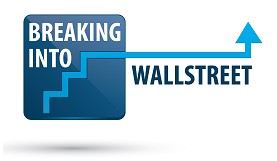 Everything you’ve learned or read about networking for jobs in finance is wrong. I know this because I’ve recently realized that everything I’ve learned or read about finance networking is wrong, too. Either you’re now confused by that statement or you think I’m being arrogant. But bear with me as we look further at how networking in the finance industry is taught online …
Everything you’ve learned or read about networking for jobs in finance is wrong. I know this because I’ve recently realized that everything I’ve learned or read about finance networking is wrong, too. Either you’re now confused by that statement or you think I’m being arrogant. But bear with me as we look further at how networking in the finance industry is taught online …
Here is how the finance networking process is usually defined as on the internet:
Step 1 – Develop a list of contacts. Research every potential firm you’re interested in and identify the people in those firms who you want to reach out to. Remember that your goal is to land an interview and then a job from that interview.
Step 2 – Prepare your cold email template (see the internet). Prepare for some light stalking.
Step 3 – Cold email everyone in your newly curated contact list.
Step 4 – Sit around and hope that one of those people email you back.
Step 5 – Holy sh*t! Somebody emailed me back and is willing to meet for coffee! You meet for coffee and ask for an interview.
Step 6 – Nail your interview and win the job offer. Yay!
Easy. Right?
While this process can land you a job offer, it misses the big picture when it comes to networking. Networking is not a simple linear process with a defined ending. It is so much more than that and it took me way too many years to figure that out.
The real way to network and get more out of life is to remember these three little words: Play the Game.
Jocko Willink uses that phrase a lot on his podcast and I always thought it had a bit of a Machiavellian ring to it. Like you are manipulating people to get your way. Indeed, the “standard” networking steps above feel like you are using people to get what you want.
However, it took me a long time to figure this out, that Jocko doesn’t mean that at all. What he’s really saying is – Build Relationships. This is the only way to success in networking and yet it’s always the most glossed over part of networking. Why is that? Because it takes work. It is not easy but the payoff at work and in even in your personal life is worth it.
So how do we build relationships in finance and on Wall Street? It starts with the alumni of your university. These people are the most likely people willing to listen to you. You need to get in front of as many alumni as possible. However, do not blindly cold email these people. You can and should use it as part of your overall strategy, but cold emailing as many alumni as possible should not be the main part of your networking strategy. I get cold emails from students all the time and I can’t recall ever responding to one.
That’s not to say I don’t help out students, I just don’t respond to cold emails. The best way to get my attention and that of other people in the finance game is to use an introduction. But you’re probably wondering – I don’t have any contacts so how am I supposed to do that? You have more contacts than you realize, you now need to leverage them by building relationships.
I said I don’t answer cold emails but I do help out students, so how does that happen? When someone I know, usually a professor, introduces a student to me. This type of introduction is WAY more effective than cold emails. Start by building relationships with your university professors – don’t just sit at the back of the lecture and sneak in and out of every class. Get to know your professors. Be active in class, stay after to chat with the professor … build that relationship! If you’re out of school, then reach back out to your old professors. You will then use those relationships to get introductions to alumni in the field you want to get into. THIS is the best way to get that cup of coffee and begin your networking.
Now you’ve been introduced to some alumni and have had the cup of coffee discussion, then comes the hard part that is always glossed over – follow up! This is the hard part in work and life and I should know because I’m terrible at it. This is the point where I constantly have to remind myself to “Play the Game” because it is hard work. Building relationships can feel like a full-time job at times, but trust me when I say it is worth it.
Then what? Follow up again!
Finance networking is not like Tinder or some other dating app, building relationships takes time. Think about your close friends for a moment – were you that close to them from the day you met? Nope. Repeated positive interactions led to building that relationship. You are now going to have to do that same thing to build your network.
So keep in contact with these people you meet in any way possible. Send a follow up after the meeting and ask the person if you can stay in touch in the future with any questions you might have. Finance folk generally think we’re really smart, so we’ll take any chance to show off what we know. Hell, that’s basically the entire existence of this website for me!
Anyway, depending on how well the initial meeting went along with the follow up, I recommended following up every one to three months. Often enough to stay on their radar screen but not so often that you’ve become an annoying pest. Obviously, feel out the person. Some are more inclined to engage more often than others. And if you don’t hear back on the first try, wait a week and then try again. No response after two tries? They are probably not worth your time at this point.
So, ideally, your relationship building efforts have landed you an internship somewhere. The game is not over then either, my friend. Start building relationships with everyone you can at that company. Then, you probably know what I’m going to say here … follow up! Don’t spend an internship building relationships only to leave them all at the door when you leave. Follow up and maintain those relationships. Provided you made a good impression, those relationships are stronger than you think.
Now your network, which started from nothing, is starting to grow and it’s time to think about getting a job in finance after graduation. This is where you can start to leverage your network to grow your network. As part of your normal course of following up and keeping in touch with your network, don’t be afraid to ask your network for more introductions. You see how it can work with your professors, believe me, it works even better with your new relationships in the business. If you’ve done a good job of building that relationship, that person will be willing to help you as long as you ask for it.
Here’s the part where I have a bit of bad news that took me a long time to figure out on my own, though – the process of networking and building relationships never ends. The best way to succeed in finance, and any job for that matter, is to build relationships up, down, and across the chain of command. It really matters!
Now go out there and start building your network knowing that it takes time and effort but it pays off in the end.



Excellent practical advice
Excellent post. One additional piece of advice is to ask them if there’s anyone they can connect you with in a tactful way, of course.